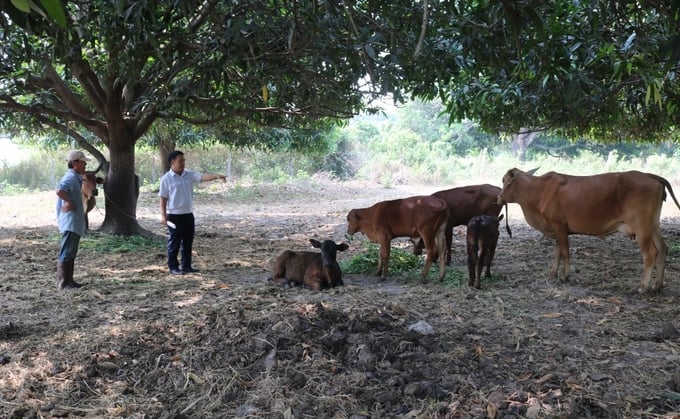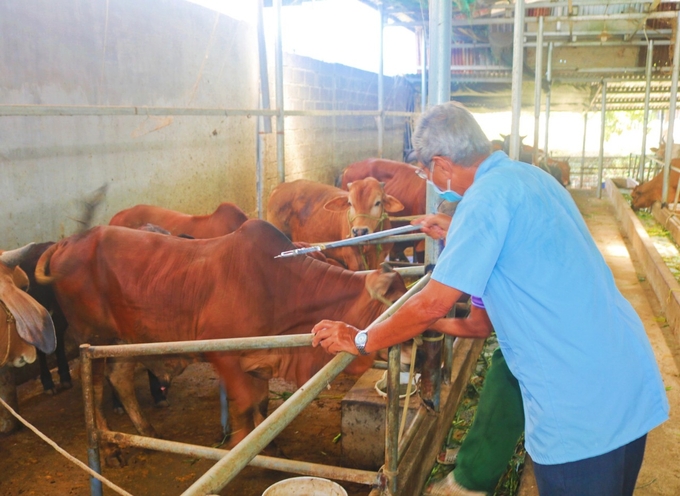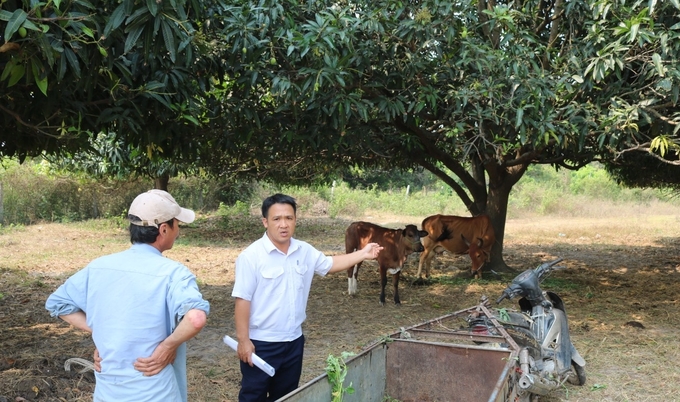November 26, 2025 | 00:15 GMT +7
November 26, 2025 | 00:15 GMT +7
Hotline: 0913.378.918
November 26, 2025 | 00:15 GMT +7
Hotline: 0913.378.918

Veterinary staff instructs farmers to care for cattle and prevent lumpy skin disease. Photo: KS.
Lumpy skin disease only affects buffaloes and cows, not humans and other animals. The disease entered Vietnam around October 2020, then spread widely to many provinces and cities across the country. According to Khanh Hoa Sub-department of Livestock Production and Animal Health, the disease was first spotted in July 2021 in Khanh Binh commune, Khanh Vinh district. After that, the disease spread to 8 districts, towns and cities, causing nearly 1,200 cows to get sick. As of November 2021, My Loc village (Binh Loc commune, Dien Khanh district) was the place where the last outbreak of lumpy skin disease was recorded.
“By monitoring the situation in search of the causes of lumpy skin disease on cattle in the area, we found that it was because of the contact with infected buffaloes and cows and vehicles transporting cattle from other places. Along with that, extreme weather has caused livestock to reduce their resistance, creating favorable conditions for pathogens to develop and spread," said Le Thang, Director of Khanh Hoa Sub-department of Livestock Production and Animal Health.
Lumpy skin disease is very contagious because it has a wide transmission route through vectors such as flies, mosquitoes, ticks, and blood-sucking gulls. Meanwhile, grazing buffaloes and cows in fields and common grounds remains a popular practice among local farmers. The conditions for livestock raising households, especially those in mountainous districts, are still limited, making it difficult to apply disease prevention measures.

Cows in Khanh Hoa are vaccinated against lumpy skin disease. Photo: KS.
Facing the situation, Khanh Hoa’s veterinary force recommends farmers raise awareness and actively apply disease-free livestock production methods, only buying healthy buffaloes and cows from reputable sources; thoroughly perform vaccination against dangerous diseases on buffaloes and cows, clean and disinfect barns with specific chemicals to kill intermediate hosts; supplement nutrients and minerals for cattle to improve its resistance.
Le Ngoc Tu, Head of Livestock Production and Animal Health Station of Cam Lam district, said that this district has roughly 4,400 buffaloes and cows at present. Since the beginning of the year, the area has not had any cases of lump skin disease because farmers are proactive in preventing the disease, not to mention the cattle herds have been fully vaccinated from October to November 2022.
Nguyen Bao An’s family, a cow-raising household in Van Tu Dong village, Cam Hoa commune (Cam Lam), is well aware of how important disease prevention and control are. “The family usually maintains a herd of nearly 20 cows. Every year we sell 5 - 7 calves, worth VND 15- 16 million/head. Raising cows is our main source of income, so we pay great attention to their health. Along with vaccination and sanitation work around the livestock area, regularly spraying insecticides will also bring positive effects because disease vectors would be eliminated”.

Veterinary staff instructed An on how to prevent diseases while raising cows. Photo: KS.
This year Khanh Hoa has recorded only one outbreak of lumpy skin disease in Xuan Tay village, Van Hung (Van Ninh), causing the death of a 4-month-old calf. There has been no new outbreak in the province since February 20.
To prevent and control disease on livestock, particularly lumpy skin disease, Khanh Hoa Sub-department of Livestock Production and Animal Health has consulted the provincial Department of Agriculture and Rural Development to issue Plan No. 502 dated February 15, 2023 on the prevention and control of livestock diseases in 2023.\
Accordingly, the veterinary force of Khanh Hoa plans to organize a vaccination campaign against lumpy skin disease in October-November before the end of the protective immunity period. The main subjects include cow and buffalo herds in livestock farms with less than 10 animals. The total number of buffaloes and cows expected to be vaccinated is 42,000, accounting for approximately 80% of the province’s total herd.
The Sub-department has also directed the district veterinary force to coordinate with local authorities to strengthen disease surveillance. In cases where a buffalo or cow is discovered to be sick, suspected to be infected with lumpy skin disease, dead of unknown cause, buffalo and cow products suspected to be smuggled or of unknown origin, samples must be taken to test for lumpy skin disease. From there, the local authorities can take measures to prevent the potential disease outbreak.
Translated by Samuel Pham
/2025/11/24/3536-2-112800_176.jpg)
(VAN) Dong Nai now has tens of thousands of hectares of forests certified for sustainable management, and this area will continue to be expanded in the coming period.

(VAN) Vinh Ha hamlet (Dai Xuyen commune, Hanoi) is shifting away from small-scale farming as households adopt bioscurity into their breeder chicken models.

(VAN) Heavy rains make aquatic species more vulnerable to disease. Proactive water management and high-tech systems help farmers prevent outbreaks and protect yields.

(VAN) Greenhouses are shifting production mindsets in Binh Lu commune, enabling farmers to ‘weather the sun and rain’ and secure stable vegetable harvests throughout the year.

(VAN) Green transition is crucial for the Mekong Delta amid climate change and stricter standards, offering a path toward sustainability.

(VAN) Dong Thap promotes agricultural restructuring, forms large specialized farming zones, raises the value of agricultural products and develops toward ecological and high-tech directions.
/2025/11/22/4018-4-213342_747.jpg)
(VAN) The Mekong Delta Agricultural Experts Club has attracted 143 experts and researchers to participate in providing consultancy and contributing initiatives to the development of one million hectares of high-quality rice.